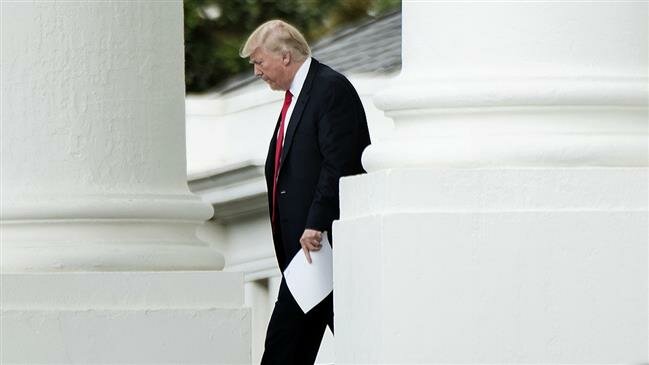The White House has contacted Swiss authorities to share a telephone number with Iran in hopes that Tehran will contact US President Donald Trump, according to a report.
According to a source speaking to the CNN, the White House contacted the Swiss on Thursday, the same day Trump publicly appealed to Iran to call him amid heightened tensions.
The source said that Iran is “highly unlikely” to demand the number from Swiss authorities.
The Swiss embassy represents US interests in Tehran, where Washington has had no mission since 1980.
Trump made the move on Thursday despite threatening Iran with military action amid his administration’s increasingly hawkish policy towards the Islamic Republic.
Trump made the comments after White House national security adviser John Bolton announced earlier this week that the US was deploying an aircraft carrier strike group and a bomber task force to the Middle East in a bid to send a “message” to Iran.
Asked about the deployment decision on Thursday, Trump said Iran had been “very threatening.”
“We have information that you don’t want to know about. They were very threatening, and we just want to have — we have to have great security for this country,” Trump said.
On Friday, an Iranian Revolution Guard Corps said Tehran would not engage in talks with the Americans.
IRGC’s deputy head for political affairs, Brigadier General Yadollah Javani said Americans think they can intimidate the Iranians to sit for talks through military rhetoric, sanctions and economic pressures.
The senior military commander also said the U-S will NOT dare to wage a war on Iran despite its deployment of bombers and an aircraft carrier to the Persian Gulf.
In a further provocative move on Friday, the Pentagon announced that it will further reinforce its Middle East deployment with an amphibious assault ship and a Patriot missile battery further counter the “Iranian threat”.
Many observers have questioned the US administration’s sudden and vague assertions about Iran in the region, citing doubtful remarks made by US intelligence officials and politicians.
Iranian officials have also dismissed the allegations as being part of the administration's “psychological warfare” against the country.
The #B_Team is at it again: From announcements of naval movements (that actually occurred last month) to dire warnings about so-called “Iranian threats”.
If US and clients don't feel safe, it's because they're despised by the people of the region— blaming Iran won’t reverse that. pic.twitter.com/AZmHbJKOch— Javad Zarif (@JZarif) May 7, 2019
Speaking on Thursday, Iran’s envoy to the United Nations Takht Ravanchi slammed the Trump administration’s allegations, saying they were based on “fake intelligence”.
Washington’s mounting rhetoric against Tehran comes as the US said last month that it would not renew waivers that allowed Tehran’s eight largest customers to purchase its oil in a bid to cut Iranian oil exports to zero and exert maximum pressure on Iran. The waivers expired on May 1.
Washington withdrew from the Joint Comprehensive Plan of Action (JCPOA) last year and reimposed unilateral sanctions that had been lifted under the landmark 2015 agreement.
Iran on Wednesday informed the UK, France, China, Russia and Germany — the remaining five signatories to the deal that it was suspending some of its commitments under the deal.
Tehran also gave the three European signatories 60 days to meet their commitments, especially in the banking and oil sectors, and guarantee Iran’s interests in the face of US sanctions.
US unilateralism
Countries affected by US sanctions have expressed discontent regarding the move, citing tight market conditions and high fuel prices that harm oil-dependent industries.
The US unilateral withdrawal from the JCPOA and further implementation of sanctions against Iran has also sparked disapproval among remaining signatories to the deal, which include Russia, China, Germany, France and Britain.
Last month, Iran’s Foreign Minister Mohammad Javad Zarif said the US decision to end sanctions waivers had even angered Washington's allies.
“People are not happy. China is not happy, Turkey is not happy, Russia is not happy. France is not happy. US allies are not happy that this is happening and they say that they will find ways of resisting it,” said Zarif.
On Friday, Germany's leading news weekly Der Spiegel published an article highlighting how Washington’s bid to pressure Iran had endangered Washington’s European allies, specifically Germany.
“Trump's confrontational Middle Eastern policy has exacerbated the tensions between the US and its European allies, because, unlike the situation in Venezuela, Europe would be directly affected. The continent's very security is at stake,” read the article.
“Washington is exacerbating regional tensions with its policy of applying maximum pressure on Iran,” said Niels Annen, a high-ranking official at the German Foreign Ministry, as quoted by the article.
Member of the German parliament with the Green Party and member of the Foreign Affairs Committee Jürgen Tritten believes, “the US appears to be looking for a pretext to escalate the conflict with Iran.”
“The claim that Iran is planning an attack against US troops in Iraq smacks of a Tonkin incident,” he added, making reference to a minor confrontation that became the pretext for the US more direct engagement in the Vietnam War.
The paper further added that European policy was in disarray in regards to Washington’s bid to pressurize Iran, with German foreign policy agreeing more with Tehran than its ally in Washington.
Deputy parliamentary group leader for the German SPD party, Rolf Mützenich, has urged the German government to push for a UN Security Council resolution “requiring strict compliance with international law in the Middle East”.
The move, as described by Mützenich, will seek to counter US policies in the Middle East region which disregard international law, notably in the case of Trump’s recent dealings over Palestine and Iran’s nuclear deal.



